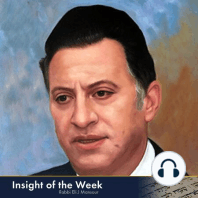20 min listen
Rosh Hashana- A Time to Stop Making Excuses
ratings:
Length:
20 minutes
Released:
Sep 24, 2022
Format:
Podcast episode
Description
The Torah commands blowing a "Teru’a" sound on Rosh Hashanah ("Yom Teru’a Yiheyeh Lakhem" – Bamidbar 29:1), and the Gemara explains that this refers to a weeping sound. The Gemara reaches this conclusion on the basis of Targum Onkelos (the ancient Aramaic translation of the Torah), which translates the word "Teru’a" as "Yebaba." This word is derived from the root "Y.B.B.," and the Gemara determines the meaning of this word from a verse in the Book of Shoftim (5:28). The context of that verse is Beneh Yisrael’s victory over the Canaanite army led by the general Sisera, who fled the battlefield and sought refuge in the home of a woman named Yael. As Sisera slept, Yael killed him, sealing Beneh Yisrael’s victory. The verse describes Sisera’s mother waiting by the window and crying – "Va’teyabeb" – as she realized that her beloved son was not returning home. This proves that the word "Teru’a," which is translated as "Yebaba," refers to a crying sound. The Gemara explains that there are different kinds of weeping, which accounts for the different sounds which we blow with the Shofar (the sounds known as "Shebarim," "Teru’a," and "Shebarim-Teru’a"). At first glance, it seems peculiar that Sisera’s mother’s cries form the basis of our understanding of the word "Teru’a." Why would specifically her weeping serve as the model of the sound of the Shofar? What connection is there between Sisera’s mother and Shofar blowing? The verses there in Shoftim tell that Sisera’s mother and her servants tried finding comfort by suggesting reasons why her son was not returning home. Perhaps he was busy celebrating, or collecting the spoils of war. Not wanting to confront the painful reality that her son had been killed, Sisera’s mother tried in vain to comfort herself by imaginary tales. People similarly use their creativity to avoid the painful reality that they have acted wrongly. It is exceedingly difficult to admit wrongdoing. In marriage, for example, when a couple has an argument, rarely does one spouse later say to the other, "I realize that I was wrong, I apologize." Admitting error, guilt and wrongdoing is very uncomfortable. And so to avoid this discomfort, we come up with excuses. We think of creative reasons for why we did what we did in an attempt to exonerate ourselves and thereby save ourselves from painful feelings of guilt and embarrassment. This is one explanation for the connection between Sisera’s mother’s weeping and Rosh Hashanah. Just as Sisera’s mother cried when she stopped making "excuses," when she confronted the painful reality that her son was not returning home, Rosh Hashanah is the time for us to stop making excuses for our behavior, and to confront the painful reality that we need to improve. In the Book of Yirmiyahu (2:35), G-d tells Beneh Yisrael, "Hineni Nishpat Otach Al Omrech Lo Hatati" – that He would be punishing them for saying, "I did not sin." This is a truly remarkable verse. G-d does not punish us for sinning; as flawed human beings, we are prone to make mistakes, and He does not expect perfection. He punishes us not for our mistakes, but for denying our mistakes. It is all but inevitable that we will commit sins, but we are expected to hold ourselves accountable, to admit our wrongdoing, to humbly acknowledge guilt, and to resolve to try harder. This concept is taught to us by King Shlomo, in Mishleh (28:13), where he writes, "U’modeh Ve’ozeb Yeruham" – "…but he who confesses and abandons [his wrongdoing] will be given mercy." We are not asked to be perfect; we are asked only to admit our imperfections and try to be better. I saw an example of this principle during a cab ride to the airport. The driver was pulled over for speeding. When the cop asked him why he was driving so fast, he said, "Look, officer, it’s not my fault, I have a passenger who is late for a flight, I am just trying to do my job…" The policeman looked at him and said, "Hey, just tell me the truth." The driver looked down and said, "Ok.
Released:
Sep 24, 2022
Format:
Podcast episode
Titles in the series (25)
Parashat Vaet'Hanan: The Consolation of Shabbat Nahamu: Insights into the Weekly Parasha - Brought to you by itorah.com by Insight of the Week
